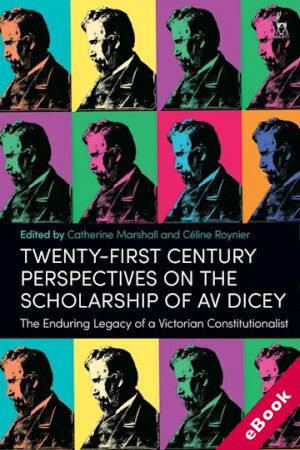
The device(s) you use to access the eBook content must be authorized with an Adobe ID before you download the product otherwise it will fail to register correctly.
For further information see https://www.wildy.com/ebook-formats
Once the order is confirmed an automated e-mail will be sent to you to allow you to download the eBook.
All eBooks are supplied firm sale and cannot be returned. If you believe there is a fault with your eBook then contact us on ebooks@wildy.com and we will help in resolving the issue. This does not affect your statutory rights.
This book reassesses A.V. Dicey's legacy in political and legal thought through the reflections of leading scholars who consider his importance not only in today's British constitutional and legal culture but also in other foreign constitutional cultures.
Every student in law and in politics, every law faculty and most legal practitioners s in the world are aware of who Albert Venn Dicey (1835-1922) was and what he wrote. Yet, this fame does not mean that Dicey's legacy is not controversial and debated in the present world. This book considers why Dicey's late Victorian constitutional and political thinking is still alive. In spite of all the transformations that have taken place in public law in the UK in the last hundred years, the book argues that Dicey managed to grasp and to crystalise something of the British political identity and culture. Hence the long-lasting fire-power of his constitutional and political thinking.
The book also considers that there is something even more prescient in Dicey's writings, for the UK but also for countries that have adopted his understanding of the rule of law and/or of parliamentary government. Dicey identified one of the most fundamental political issues at stake: the nature of the relationship between public law and democracy. The book looks closely at the alliance between public law and democratic spirit. This alliance needs to be reassessed from a legal, historical and comparative perspective. This edited collection, gathering authors from different countries, from various legal systems and from diverse backgrounds, tackles this task.